Chat With Regine Rousseau, Brand Ambassador & Wine Educator
“Close your eyes and let’s go,” says Regine Rousseau as she begins to define the area where Pinot Grigio delle Venezie wines come from. Rather than buckling up our seatbelts (this time), we toasted or ‘facciamo un brindisi’ in Miami Beach!

Regine is the Brand Ambassador for the Consorizo Pinot Grigio DOC delle Venezie. That’s a long name, we know. But among many great things, it means that quality is key. Most importantly, wine should be fun! Open the seal of wonderful experiences, and your magical journey begins. Regine makes wine learning approachable and the ‘grammar’ that goes with it, simply understood.
Live in Italy Magazine was pleased to be on location at Miami’s South Beach Wine and Food Festival. We had a delightful time with Regine. Enjoy watching the interview on YouTube. If your first language is either Italian or Spanish, just switch to your language of choice in the menu 👆🏼 and follow along below.
Andiamo!
Preview in new tab(opens in a new tab)
Watch the interview and follow along belong. Please subscribe, like, and comment too! 👍🏻
Who is Regine Rousseau? (1:25)
Oh, come on! That’s a tough question. Regine is a woman of the world. No,just kidding! I am the Brand Ambassador for Pinot Grigio delle Venezie. So what does that mean? I help the consortium promote the wines. I help educate consumers on the wines and how to incorporate our wines into their lifestyle. So that’s what I do.
What is a Consorzio (consortium)? (2:06)
The best way for me to describe it and simply is that it’s a body. The goal of the Consorzio is three-fold:
(1): They wanted to create an identity for Pinot Grigio delle Venezie. They wanted to define what a really good Pinot Grigio delle Venezie looks like.
(2): They wanted to create systems to elevate the wines. Prior to the Consorzio being created in 2017, the area and the wines were an ‘IGT’ which is the first tier in the Italian wine scale. Now, the wines are a DOC, so they have been elevated to the next level.
So how did they do that? Well, basically quality control; implementing things like reducing the yield so you have a higher quality wine.
(3) And the third thing is that their job is to promote and share the good Pinot Grigio delle Venezie news!
So quality is key?
Yes!
Pinot Grigio is a common wine, but we’re talking about a specific area. Where in Italy are we? (3:30)
Yes, so close your eyes. Let’s go! We’re going to the northeast region of Italy. If we’re going from west to east, the area covers Trento (Trentino); then it goes to Veneto, and then Friuli Venezia Giulia. So that’s where we are in the northeast region of Italy.
The geography goes into the glass. The Triveneto right? (4:17)
You’ve got it! We’re in talking about the Dolomites which is in Trentino. (My Italian is not as good as yours so all of you Italian watchers, please forgive me!) Then, in Veneto you have the Alps in the northern part; in the west you have Lake Garda; and then southeast you have the Adriatic Sea. In Trentino, you have high elevation and in Friuli Venezia Giulia you have limestone soils. You also have the influence of the Alps.
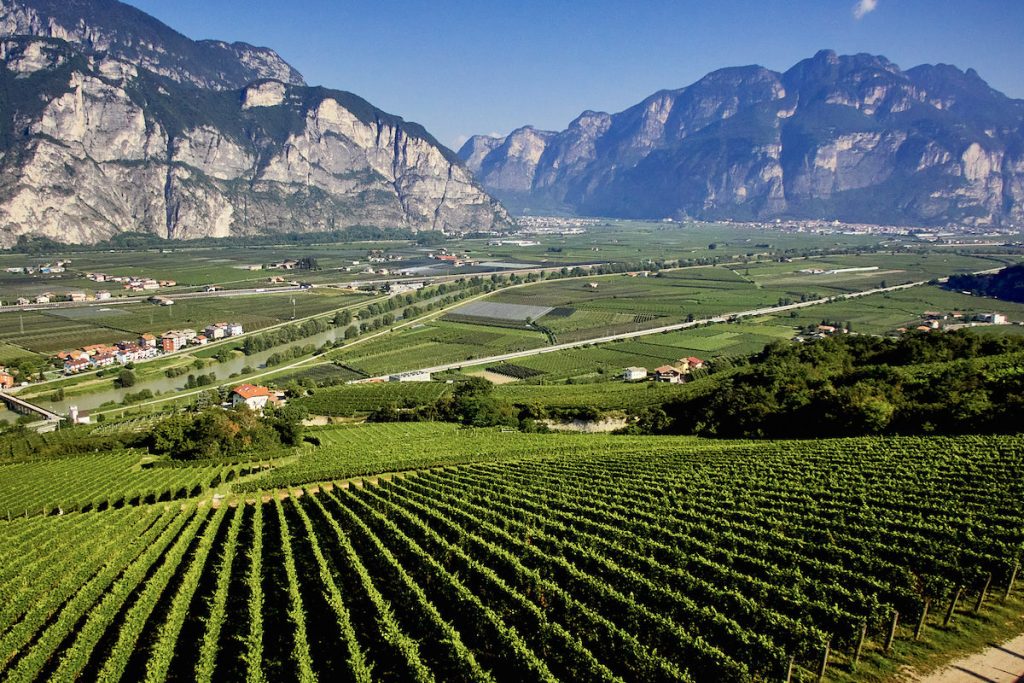
So why am I telling you all of this? What that does and means is that the area has this climate and has the structure or elements to produce a very specific style of Pinot Grigio. And that style is great fruit balanced with high acid. Our wines are simple, but elegant. They have beautiful style, beautiful fruit, and acidity. They have this ability to work with a lot of different styles and foods, and a lot of different moods.
Because sometimes it’s not about your food, it’s about your mood.
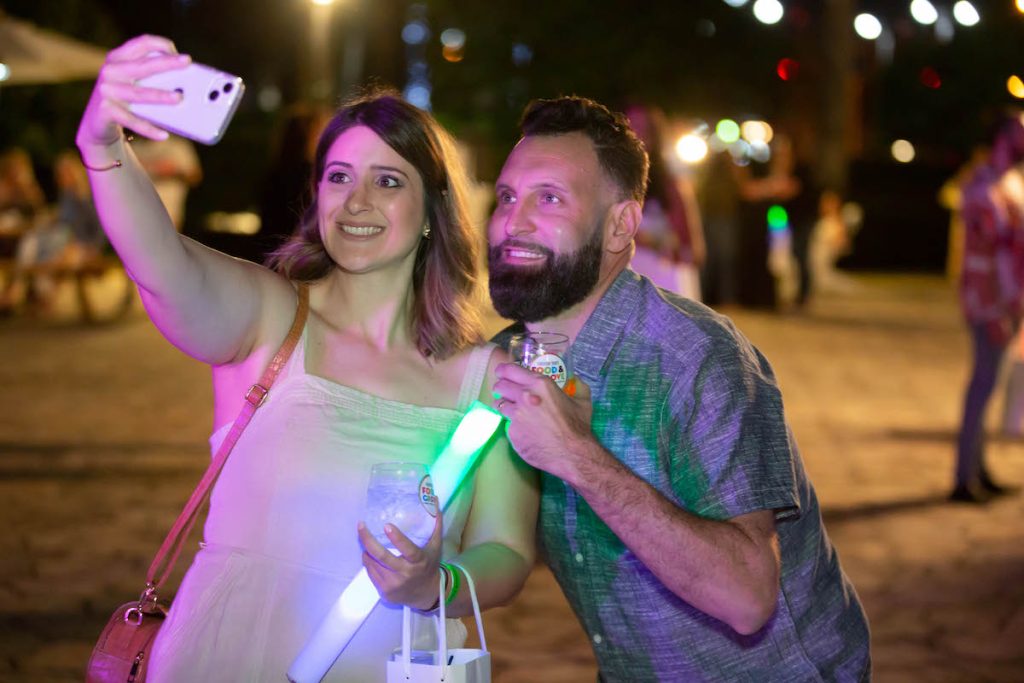
Let’s talk about different styles. I believe that there are four. (6:16)
We have Pinot Grigio, what you are seeing in our glasses. This lemon or maybe lemon-green straw color. Maybe floral lemon and lime flavors, and sometimes a bit of almond. That’s what we are used to seeing, but we also have a rose’ style known as ‘romato’. It has to be 85% Pinot Grigio grape. Then we have Bianco which is a blend of white grapes from the area and then we have the sparkling wines. I’m always excited about the sparkling wines. We have the frizzante and spumante sparkling wines.
Tell us simply what is difference between frizzante and spumante? (7:08)
The difference is the effervescence. Your spumante will be more effervescent and more bubbly, for a lack of better terms, and then frizzante will be lightly sparkling. So, the bubbles will dance in your mouth a bit, but they’re not as noticeable as with the spumante.
When you are in Italy or in a restaurant, what should we be looking for? (8:00)
Great question! The key marker is to look for the seal. Let’s show everyone the seal. So, this is the seal and we love to call it, ‘the seal of wonderful experiences’. I’ll tell you what to look for. It says ‘DOC’ and that is the second tier of higher quality. But when you see that seal you know that it’s the guaranteed place of origin and quality. That’s what you need to look for.
Not every winery in this area qualifies. They have to go through an application process, right? (8:43)
Yes, it’s really strict. All of the wines that have this seal of wonderful experiences go through a process of being tested by an independent panel of enologists. They taste the wines and say “yep, this is quality Pinot Grigio delle Venezie. It can have the seal. Go for it!”
If it does not have the seal, it did not pass the test.
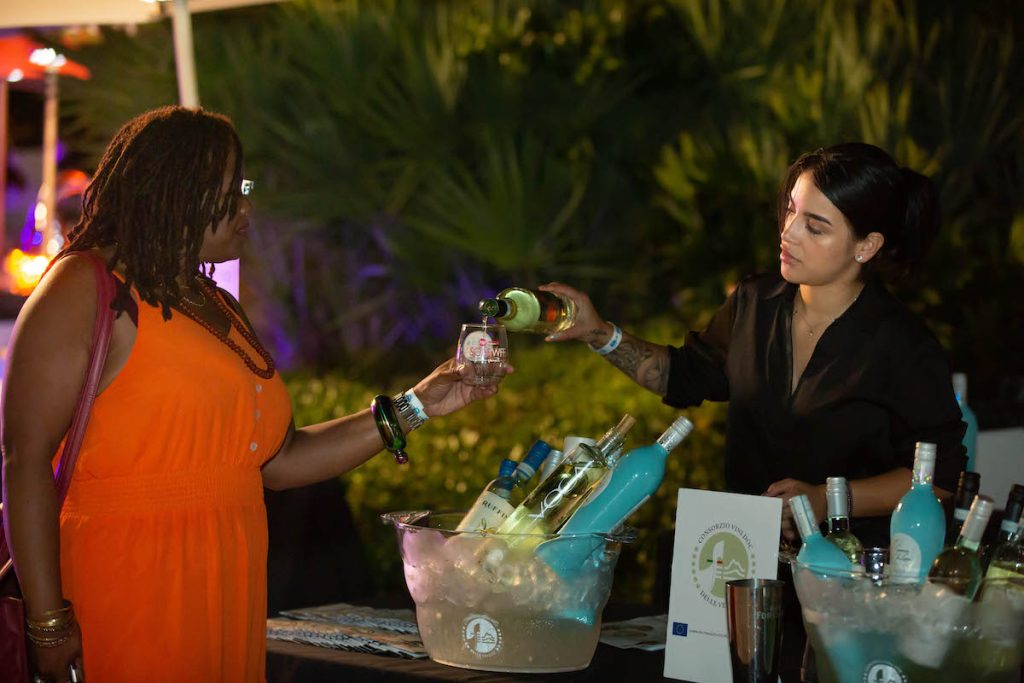
Let’s talk about food pairings because especially in Italy, wine and food are synonymous. First, tell us the most common ones. White wine goes with… (9:40)
Now I would say, what type of white wine? It’s not that simple. Let’s bring it back home to Pinot Grigio delle Venezie. The wines in terms of flavor, I mentioned lemon, lime, pear and sometimes some almond on the finish and a little salinity. All of us sudden, you are thinking about shrimp, fresh seafood, and salads. Those are some classic pairings to me. But you can also have a little fun with it because when you have a wine like Pinot Grigio that has high acid and good fruit, it has the ability to work with a lot of different foods.
Recently I had a did a TV segment where I paired it with kale chips. Why kale chips? You think about when you have vegetables and squeeze little bit of lemon on your vegetables, what happens? They are fresher right? You throw a little sea salt on them. It’s the same combination as the wines and adding the lemon notes and sea salt then it all of us a sudden perked up those kale chips. That’s one of my favorite pairings at home.
What is an unusual Pinot Grigio delle Venezie pairing? (11:17)
I don’t know if this is unexpected. You tell me because you’re a foodie. I paired a ‘romato’ (or rosé) with a hotdog. You have the saltiness of a hotdog, the fat from the hotdog…
Lisa: You’re not just talking about a Chicago hotdog? [Regine lives in Chicago.]
Regine: No, this was a beef hotdog, so it was pretty flavorful. I didn’t do mustard because it sometimes kills things. I had a bottle and thought this is perfect. You’ve got to think again that they don’t take away anything from food, they add to food. Even if you don’t have a classic pairing, it might work because wines simply give food a lift, a little acid and a little ‘something something’ without taking anything away.
Making Wine Approachable (12:26)
Lisa: You are a wine educator and working for the Consorzio and on your website you say that it is your objective to make wine approachable. For me who’s learning wine, sometimes I sit down at these tastings and feel like a foreigner. I don’t understand the language. How do you as a wine consultant and educator, make it so you don’t feel excluded because they don’t know certain terms; or the names of the grapes; what DOC is, and things like that?
Regine: I love that you said that because what we have to understand as professionals is there are levels to this. There are people who just want to enjoy a good glass of wine. They want to walk into a beautiful store and feel confident that they know maybe five or six different types of wine to buy. And so, we have to speak to them because that is part of our audience as educators.
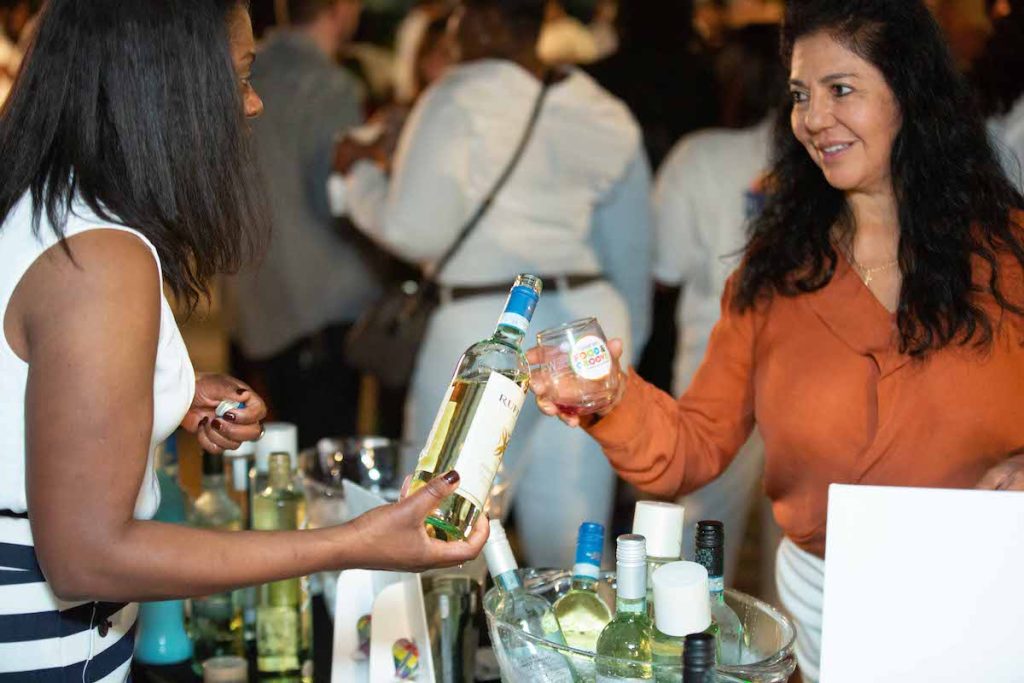
For me, what I do is think that I wasn’t born into this world. My parents didn’t have wine on the table. So, when I started working in the wine business, I was a foreigner and I always remember that feeling. What I do is that to the best of my abilities, I explain everything. If I mention a term like acidity, I explain what that means and where you feel acid in the mouth drinking wine. I am speaking to a person who is a novice or I’m speaking to the person who is a professional. At the end of the day, we all just want to enjoy wine together and speak that same wine language.
So, it’s important to keep it fun? (14:06)
Regine: Absolutely! And it’s important to understand and allow other people to have their own expression. Someone may not understand acidity, but they may say it’s mouthwatering. Same thing!
Lisa: I love what Regine says about feeling like a foreigner because that is an objective of Live in Italy Magazine. It’s about ‘get uncomfortable’. We’re all foreigners to something sometime. It doesn’t mean that we shouldn’t approach it, learn, and feel uncomfortable or embarrassed.
Regine: Yes, create your own space in the world.
Let’s talk about the South Beach Wine and Food Festival. You’re from Chicago, so I guess a trip to Miami Beach is not a bad thing? (14:52)
Listen, I signed up for that gig so fast! I am available and will clear my calendar and be here!
And Regine was part of a wonderful Consorzio dinner last night. What did you do today here at Vinya? (15:04)
At Vinya we did a wine and a cheese pairing with of course, Pinot Grigio delle Venezie. It was super cool because the guests got to see how flexible the wines are and how they worked with different types of cheese. Some of the cheeses like the truffle cheese was very pungent and then finding a wine to work. That was a lot of fun and I love do food and wine pairing classes.
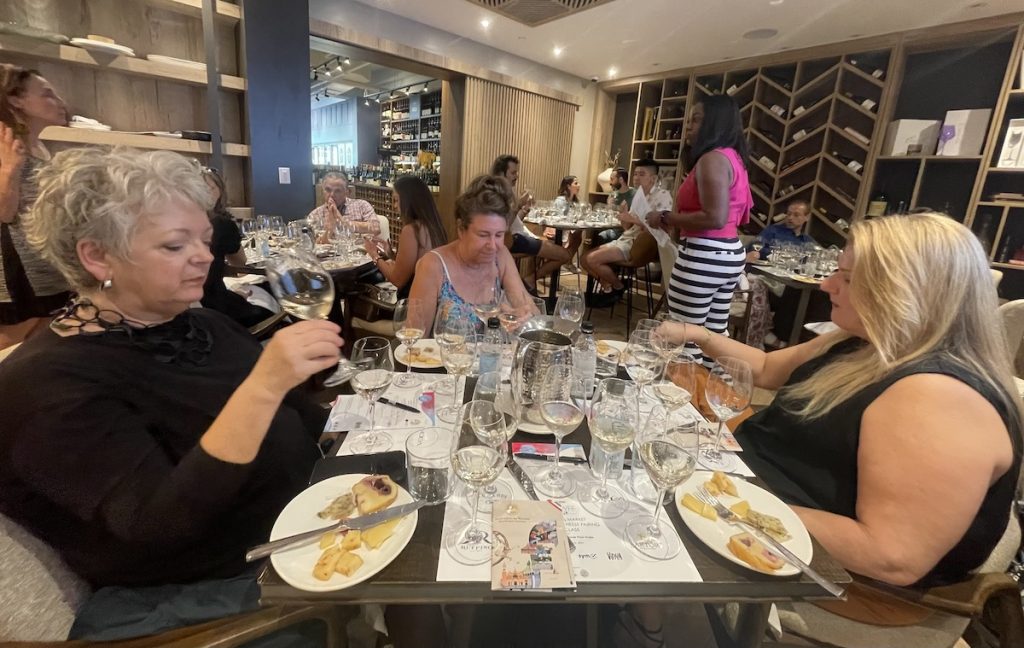
It’s always a struggle for me to decide what wine goes best with salad. Pinot Grigio would go well with what kind of salad dressing? (16:08)
Because Pinot Grigio has good acid, you can pair it with a lemon vinaigrette. Something with enough acid to hold up to the wine. One of the food and wine pairing rules is ‘power to power’. The wine has good acid, it’s okay to have a vinaigrette with it because it’s not going to kill or break down the wine.
Lisa: These terms are going to stick in my head like ‘power to power’. So, you match what’s in your wine to what the food is.
Regine: Absolutely!
Lisa: This is Wine 101 today!
Finally, tonight! Where are we going? (17:00)
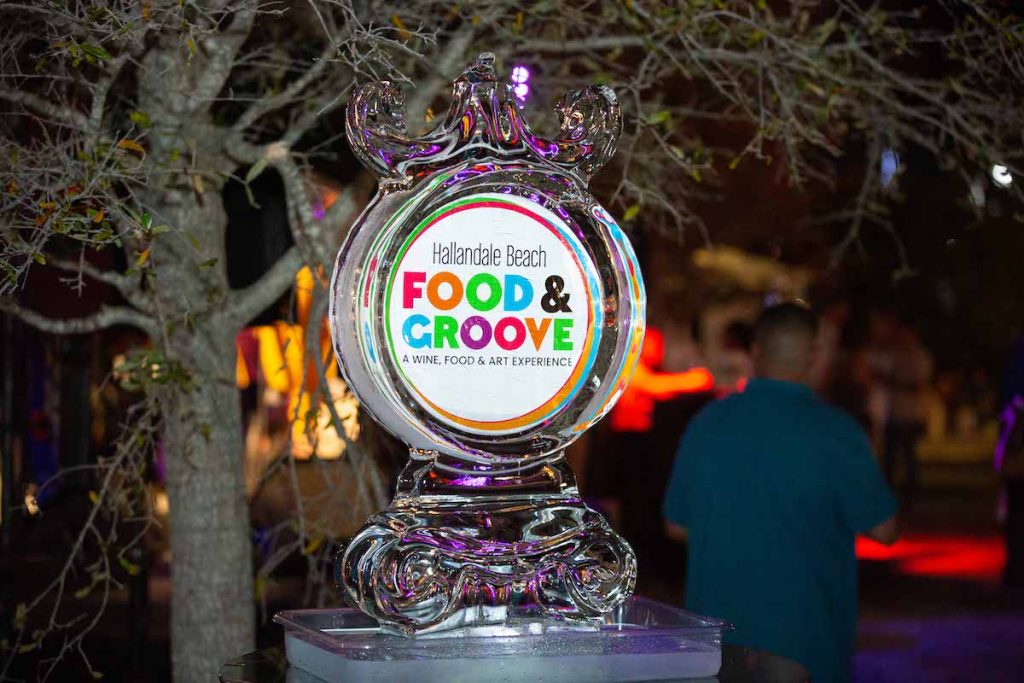
Regine: Food and Groove! I don’t know, it’s the beach.
Lisa: It’s South Beach!
Regine: I’m so confused since it’s not where I’m from. Thanks Uber! We’re going to be on the beach. There’s going to be wine, food, and music. It’s a white party, so I have to go find something white to wear.
Regine: ! I’m super excited because Pinot Grigio delle Venezie is about fun. It’s a wine that you can open any time and have a wonderful experience and so being in that kind of environment when you’re partying…it’s just perfect!
Lisa: I love it. Again, fun!
Regine: Absolutely!
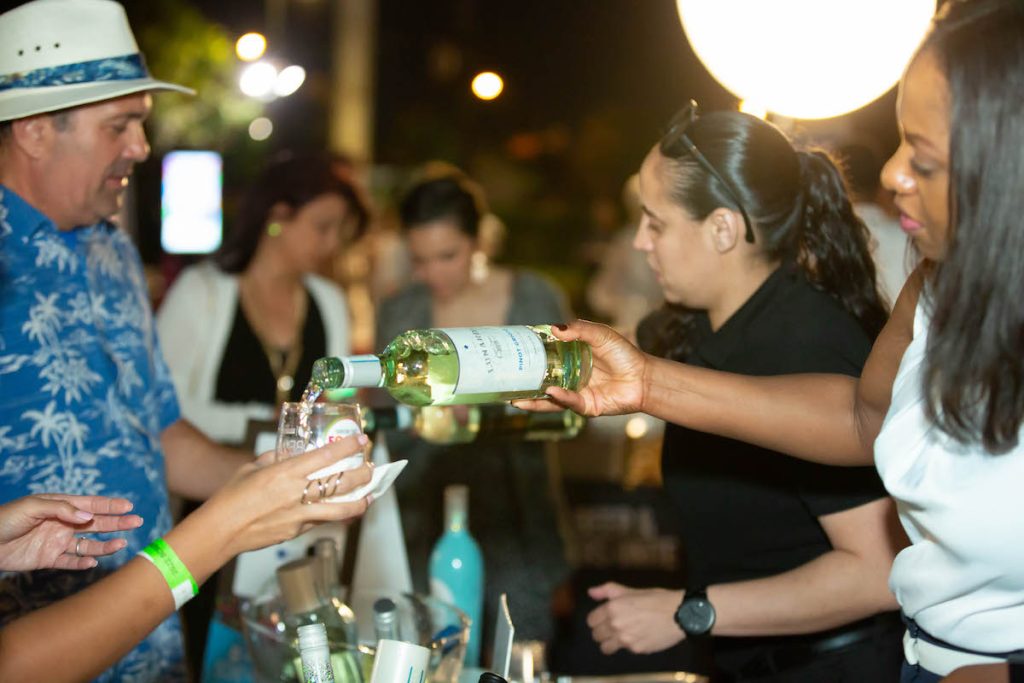
Food & Groove at the South Beach Wine and Food Festival
Chat With Valentina Fraccascia, Communications for Delle Venezie
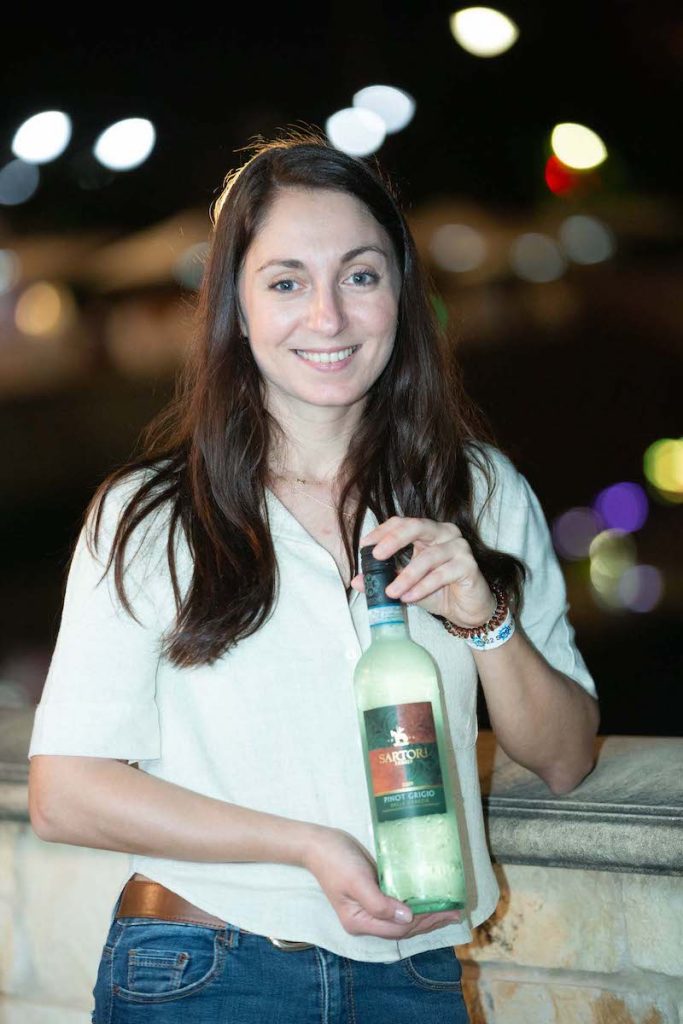
What do you want people to know about Pinot Grigio delle Venezie and why should they be drinking it? (19:15)
Pinot Grigio doesn’t just mean wine. It means history, tradition, and culture. In our area, you can smell Pinot Grigio everywhere. Pinot Grigio delle Venezie is ceritifed DOC. It means that it has to follow a specific regulation by the European Union. So, when you see on the label (or neck of the bottle) this DOC seal, it means that the producer had to follow a specific regulation and had to pass through a very rigid certification process.
That is very important for the consumer to know when they are buying even though Pinot Grigio delle Venezie can be found at a pretty reasonable cost. You can be sure that you are drinking a high-quality product and certified by the European Union.
Be sure to drink Pinot Grigio delle Venezie because it’s the best!
The Seal of Wonderful Experiences.
How does the geography factor into the glass? (21:11)
In the Triveneto area we have two different types of climates. We are talking about a Mediterranean climate coming from Lake Garda and the Adriatic Sea: a warmer summer that is good for the ripening of the grapes. But also we have a very cold winter because we have a continental climate coming from the Alps. For example, in Friuli-Venezia Giulia and Trentino, we have the Alps chains (Carnic Alps) and in Trentino we have the Dolomites.
This combination creates the perfect environment for growing the Pinot Grigio. It’s a very sensitive grape. It needs chilly weather and wind because otherwise it is very sensitive to diseases. This is very important, but it’s also important to have a good ripening period in the summer. So, this creates a perfect condition.
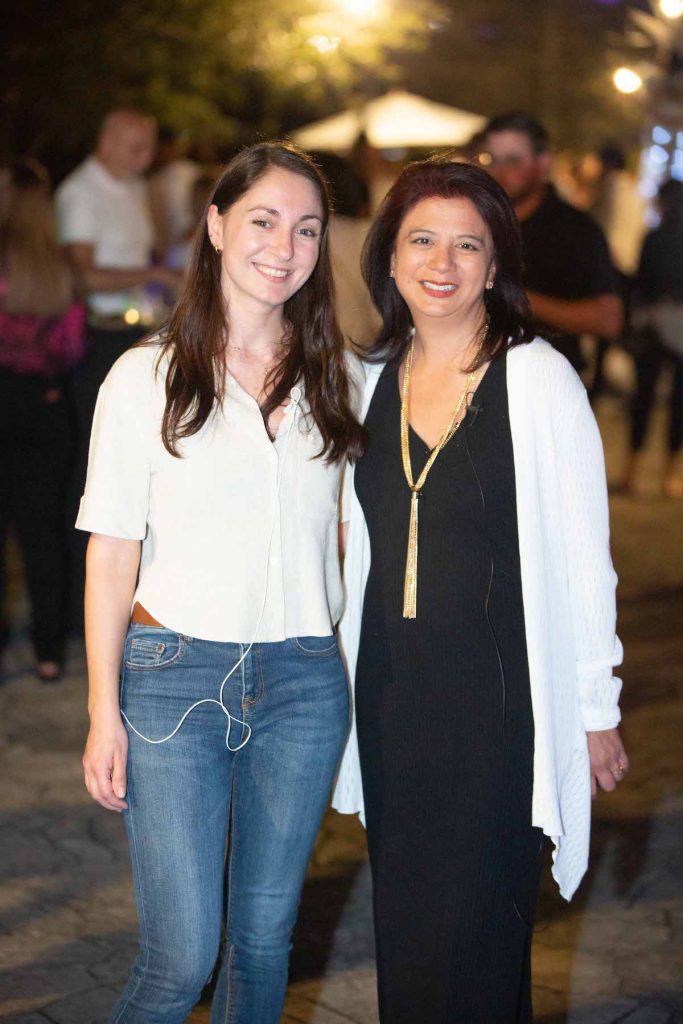
A Good Reason to Visit Italy!
Lisa: And, also to visit right? You’ve got everything whether you are a nature buff, or love the ocean, big cities or the small areas and lesser known places. You have it all in the Triveneto area.
Learn More About Pinot Grigio Delle Venezie
VISIT PinotGrigio.Wine
FOLLOW @DelleVenezie
A very special thank you to IEEM USA for connecting us to the beauty of delle Venezie Pinot Grigio and this spectacular region of Italy. Follow @IEEMUSA and @IEM. Thanks also to Vinya Wine & Market that allowed us to film this interview in their tasting room.


